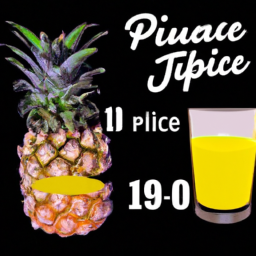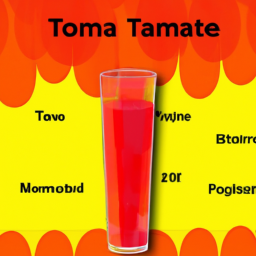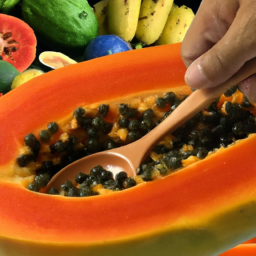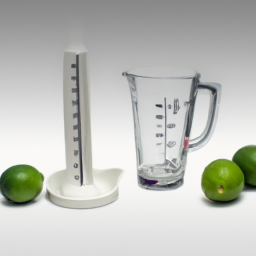I love drinking pineapple juice! It’s a great way to get essential vitamins and nutrients while feeling refreshed. But like all perishable items, pineapple juice has an expiration date. So, how long can you keep drinking pineapple juice before it goes bad?
In this article, I’ll share with you everything you need to know about the shelf life of pineapple juice, including the factors that affect how long it lasts, how to store it properly, and how to tell if it has gone bad.
Pineapple juice is not only tasty, but it’s also packed with nutritional benefits. It contains high levels of vitamin C and manganese, which are essential for maintaining a healthy immune system and supporting bone health, respectively. Pineapple juice is also a good source of bromelain, an enzyme that aids in digestion and has anti-inflammatory properties.
However, these benefits can only be enjoyed if the pineapple juice is fresh and hasn’t gone bad. So, let’s dive into how long pineapple juice can last and how to keep it fresh for as long as possible.
Key Takeaways
- Proper storage is essential for maintaining the nutritional benefits of fresh pineapple juice, which includes high levels of vitamin C, manganese, and bromelain.
- Once opened, refrigerated pineapple juice should be consumed within 5-7 days, while unopened juice can last up to 8 months in the pantry.
- Signs of spoiled pineapple juice include sour or vinegary smell, cloudy or dark appearance, and mold growth, and drinking spoiled juice can lead to food poisoning and bacterial infections.
- Pineapple juice can be used for various purposes, such as a mixed drink, marinade for meats, natural cleaning agent, and fertilizer, and proper handling and disposal methods can reduce environmental harm.
The Nutritional Benefits of Pineapple Juice
You’ll be pleasantly surprised by how pineapple juice not only quenches your thirst but also provides a multitude of nutritional benefits to keep your body healthy and energized. Pineapple juice is a rich source of vitamin C, which is essential for maintaining a healthy immune system. It also contains bromelain, an enzyme that helps in breaking down proteins, aiding in digestion and reducing inflammation.
Pineapple juice recipes are also a great way to incorporate other important nutrients into your diet. For example, adding coconut water to pineapple juice can help replenish electrolytes lost during exercise. Additionally, blending pineapple with spinach or kale can create a nutrient-dense green juice that is packed with vitamins and minerals.
The health benefits of pineapple juice are undeniable, making it a delicious and nutritious addition to any diet. Speaking of nutrition, it’s important to know how long is pineapple juice good for.
How Long is Pineapple Juice Good For?
If you’re a fan of this tropical drink, it’s important to know how to keep it fresh for as long as possible. Proper storage is key to extending the shelf life of pineapple juice. Once opened, it should be refrigerated and consumed within 5-7 days.
Unopened pineapple juice can last up to 8 months in the pantry, but it’s best to keep it in the refrigerator to retain its quality for longer.
Apart from knowing how long pineapple juice can last, it’s also essential to understand the benefits of consuming pineapple juice regularly. Pineapple juice is a rich source of vitamin C, which helps boost your immune system. It’s also an excellent source of bromelain, an enzyme that aids in digestion and reduces inflammation. With its numerous health benefits, it’s no wonder that pineapple juice is a popular choice among health-conscious individuals.
Understanding the proper storage and health benefits of pineapple juice can help you enjoy this tropical drink to the fullest.
Next, let’s take a look at the factors that affect pineapple juice shelf life.
Factors That Affect Pineapple Juice Shelf Life
When storing your sweet and tangy pineapple juice, it’s important to consider the factors that affect its shelf life.
Temperature is one of the most crucial factors that can impact the freshness and flavor of your juice. Pineapple juice should be stored in a cool place, ideally between 32 and 40 degrees Fahrenheit, to prevent bacterial growth.
Exposure to light and air can also cause the juice to spoil quickly. Thus, it’s recommended to keep the juice in an airtight container and away from direct sunlight.
Preservation methods can also affect the shelf life of pineapple juice. For instance, pasteurized pineapple juice can last up to six months when stored properly, while unpasteurized juice has a shorter shelf life.
Additionally, adding preservatives like citric acid or sodium benzoate can prolong the juice’s shelf life. Understanding these factors is crucial in maintaining the quality of your pineapple juice.
In the next section, I’ll discuss how to store pineapple juice properly for maximum freshness.
How to Store Pineapple Juice Properly
Proper storage of pineapple juice is essential in preserving its delicious flavor and preventing spoilage. The first step in proper storage is to keep the juice refrigerated at all times. Pineapple juice should be stored in a clean, airtight container that’s specifically designed for food storage. This will help to prevent contamination and keep your juice fresh.
It’s also important to avoid contamination when storing pineapple juice. This means that you should always use clean utensils when pouring the juice and avoid touching the inside of the container with your hands. By following these simple steps, you can ensure that your pineapple juice stays fresh and delicious for as long as possible.
In the next section, we’ll discuss some tips for extending the shelf life of your pineapple juice even further.
Tips for Extending Pineapple Juice Shelf Life
To keep your pineapple juice tasting fresh and delicious for as many days as possible, try these simple tips.
Firstly, refrigerate your pineapple juice immediately after opening it. This will prevent bacteria growth and maintain the freshness of the juice. Keep it in an airtight container, preferably glass, to prevent oxidation. This will also prevent the juice from absorbing any unwanted smells and flavors from the fridge.
Another way to extend the shelf life of pineapple juice is to get creative with recipes. You can mix it with other juices to make a refreshing fruit cocktail or add it to smoothies for an extra tropical twist. You can also use pineapple juice as a marinade for meats or a glaze for roasted vegetables. These preservation methods not only help to maintain the freshness of the juice, but they also allow you to enjoy it in different ways, making it a versatile ingredient to have on hand.
Now that you know how to extend the shelf life of your pineapple juice, you may be wondering how to tell if it has gone bad. Let’s explore some signs that indicate your juice may have passed its prime.
How to Tell if Pineapple Juice Has Gone Bad
If your pineapple juice smells sour or has developed a cloudy texture, it’s time to toss it out. Consuming expired pineapple juice can cause food poisoning, stomach upset, and other health issues. But before you dispose of it, you can still use it in other ways.
One alternative to drinking expired pineapple juice is using it as a marinade for meats, poultry, and seafood. The enzymes in the juice can help tenderize the meat and add a sweet and tangy flavor. You can also use it as a base for smoothies or mix it with other juices to create a fruity cocktail. However, if you notice any common signs of spoiled pineapple juice such as a rancid smell, mold growth, or a fizzy texture, it’s best to discard it immediately.
Common Signs of Spoiled Pineapple Juice
As you take a sip of the once-refreshing drink, the pungent odor and slimy texture of the spoiled pineapple juice make you cringe. It’s important to know the common signs of spoiled pineapple juice to avoid this unpleasant experience.
Smell test and color changes are the two most significant indicators of spoiled pineapple juice. If the juice smells sour or vinegary or has a cloudy or dark appearance, it’s best to discard it.
Additionally, understanding juice labeling is crucial in determining the freshness of pineapple juice. ‘Best before’ dates refer to the time period when the juice is at its peak flavor and quality, while expiration dates indicate the last date that the juice is safe to consume. It’s best to consume pineapple juice before the ‘best before’ date, and never consume it past the expiration date as it may lead to health risks.
With these indicators in mind, you can easily identify spoiled pineapple juice and avoid the risks of consuming it.
Transitioning into the subsequent section about the risks of consuming spoiled pineapple juice, it’s essential to know that drinking spoiled juice can lead to food poisoning and other serious health issues.
It’s vital to handle and store pineapple juice properly to prevent contamination and spoilage.
Risks of Consuming Spoiled Pineapple Juice
You think drinking spoiled pineapple juice is a great idea, right? Think again! Consuming spoiled pineapple juice can lead to serious health risks that you definitely want to avoid.
Here are some of the risks associated with drinking spoiled pineapple juice:
-
Food Poisoning: Consuming spoiled pineapple juice can cause food poisoning, which can lead to symptoms such as vomiting, diarrhea, and stomach cramps. These symptoms can be severe and can even lead to hospitalization in some cases.
-
Bacterial Infections: Spoiled pineapple juice can contain harmful bacteria such as E. coli or salmonella, which can cause infections in the digestive system. These infections can lead to serious health issues and can even be life-threatening in some cases.
-
Allergic Reactions: Spoiled pineapple juice can also cause allergic reactions in some individuals, which can range from mild to severe. Symptoms of an allergic reaction may include hives, itching, and difficulty breathing.
To avoid these health risks, it’s important to dispose of spoiled pineapple juice properly.
How to Dispose of Spoiled Pineapple Juice
Wondering what to do with spoiled pineapple juice? Here’s how to dispose of it properly and avoid health risks.
First and foremost, never pour spoiled pineapple juice down the drain or toilet as it can harm the environment. Instead, you can use it as a natural cleaning agent. Pineapple juice contains enzymes that can break down stains and grease, making it a great alternative to harsh chemicals. Simply dilute the juice with water and use it to clean surfaces such as countertops, floors, and even your oven.
Another eco-friendly disposal option for spoiled fruit juice is to use it as a fertilizer. Pineapple juice is rich in nutrients such as potassium, magnesium, and calcium which can benefit your garden. Dilute the juice with water and pour it over your plants or mix it into your compost pile.
This way, you are not only disposing of the juice responsibly but also contributing to the growth of your plants. By finding ways to recycle pineapple juice, you can avoid wasting it and reduce your carbon footprint.
Frequently Asked Questions
Can pineapple juice be frozen for later use?
I froze my pineapple juice and it’s still good! Just make sure to leave some room in the container for expansion. When thawing, place it in the fridge overnight and give it a good shake before using.
Is it safe to drink pineapple juice after it has been left out overnight?
I wouldn’t recommend drinking pineapple juice that has been left out overnight. Without proper refrigeration methods, bacterial growth can occur, leading to potential foodborne illness. It’s best to discard the juice and always store it properly.
Are there any health risks associated with consuming expired pineapple juice?
Did you know that pineapple juice contains bromelain, an enzyme with anti-inflammatory properties? However, consuming expired juice can lead to foodborne illness. Always check expiration dates to avoid health risks and enjoy the benefits of fresh pineapple juice.
Can pineapple juice be mixed with other juices or drinks?
I enjoy mixing pineapple juice with other juices or drinks to create unique flavor combinations based on my taste preferences. There are many mixing options, including adding it to smoothies or cocktails, or combining it with other fruit juices like orange or mango.
How long does it take for pineapple juice to spoil once opened?
Once opened, pineapple juice storage depends on factors like temperature and exposure to air. Its shelf life can range from a few days to a week. Properly stored, it stays fresh and delicious.
Conclusion
In conclusion, knowing how long pineapple juice lasts is important for maintaining its nutritional benefits and avoiding health risks.
Through proper storage and handling, pineapple juice can stay fresh for up to one week. But factors like exposure to air, temperature, and contamination can shorten its shelf life.
It’s important to check for signs of spoilage before consuming, such as changes in color, odor, and taste. Just like a pineapple that’s been left out for too long can become rotten and inedible, so can its juice.
So, take care of your pineapple juice, and it’ll take care of you. With these tips in mind, you can enjoy the sweet and tangy taste of pineapple juice while reaping its many benefits.
Ilana has been a vegan for over 10 years. She originally made the switch for health reasons, but soon found herself becoming more and more passionate about the ethical and environmental implications of a vegan lifestyle. Ilana is the author of The Graceful Kitchen, a blog all about veganism. She loves to cook up delicious and nutritious vegan meals, and share her recipes with others who are interested in leading a cruelty-free life. Ilana is also a strong advocate for using whole foods as the foundation of a healthy diet, and believes that going vegan is one of the best ways to achieve this.










